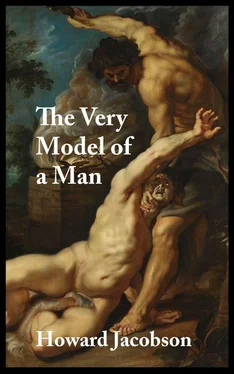Asmar loves to have an audience when he is yotzing, and finds it hard to understand how any Shinarite who has seen him at his wheel with his fingers wet and flying could ever derive satisfaction from watching anything else. He wears a smock which he has designed himself, a loose, billowing garment that leaves his arms, his legs, and most of his chest free. Asmar would not be surprised were anyone to tell him that his appearance — or whatever the word is that encompasses his dress, demeanour, skill and confidence around clay — has an inflammatory effect on the women of Babel. He has seen three wives into their graves so far, and can conceive of no obstacle to his seeing another dozen. Women are drawn to him, flimsy as he is in stature and squeaky as he is in voice. It is not up to him to decide why, but he assumes it is a combination of well-shaped limbs, engaging manner, free morality (as advertised by his single ear-ring) and familiarity with the first material — the earth itself.
‘They smell something primal on me,’ he explains. ‘They would know, even if they were blind, what I’ve been doing with my hands.’
The chief recipient of such explanations is Asmar’s eldest son, Esay. Asmar is having trouble convincing Esay of the plain and functional let alone the venereous properties of grey earth mixed with a little water. He has the ambition of passing on to his son a successful business and a name loaded with honours, but Esay, though he holds with the wearing of a single ring in his ear, pictures himself in a more verbal profession — perhaps story-telling — earning the admiration of women because of what comes out of his mouth, not what sticks to his fingers. The activity of yotzing itself, by which he means the way it is necessary to sit and the shapes he must make with his hands, is inimical to his idea of creative freedom. ‘I hate having to bear in upon the clay,’ he counter-explains to his father. ‘The pot expresses its true nature by trying to escape from the wheel, by swelling upwards and outwards, by returning to its original plastic matter. But the potter must prevent this. He must be a sort of gaoler to the pot.’
If you would see a yotzer beside himself, Asmar is the man to watch. He flattens whatever is rising from his wheel. He overturns trays of frit and feldspar, sends flying jars of bat-wash, slurry, bowls of blood-red water for moistening his sponges. ‘A gaoler to the pot! What sort of talk is this? Show me the bars! Show me the keys!’ He attacks his boy with biscuit-bats and whirlers, he corners him with cutting-tools, he threatens to lock him in the kiln — he’ll show him gaol! — and not let him out until he’s stone.
‘I just don’t have the right temperament for it, father,’ says Esay, backing off. (‘I don’t have the yetzer for it,’ he might have said.) ‘I’ll only end up setting all my pots free.’
Tonight, as Cain approaches from one direction, and Sisobk shuffles from another, this is exactly what Esay is doing. He is liberating every pot he can lay his hands on — pitchers, ewers, gallipots, amphorae still wet from the wheel — by throwing them at his father. And Asmar, because he is holed up in the production and not the display section of his yotzery, and because he would not damage anyway a yot he has turned with love and exactitude himself — Asmar is retaliating with the only weapon he has by him, which is clay.
What Cain sees when he pauses at the brilliantly lit window — Asmar’s stage — is two men, covered from head to foot in slub the colour of rats, each with a little hoop of gold protruding, and each groping in his primal blindness for something more to plaster on to his assailant.
What Sisobk sees is Cain.
His heart leaps, lurches, begins beating on the right side of his chest. ‘Come with me to Padan-Aram!’ he cries, but then holds back, for the father of nay-sayers, the lover of Zilpah, is in difficulty, is having trouble breathing, can barely stand, must squat right there, right now, in the public street and clasp his legs and drop his head below his knees.
Is this my moment, Sisobk wonders, is this the hour when it is given to me to hold his hand?
For his part, Cain is unaware of Sisobk’s presence. Asmar’s window holds all his attention, fills him with a repugnance which won’t let him look and won’t let him leave. Any other man would find the slime-fight funny. He wishes he could find something droll in it himself. But he is disabled by the spectacle of fisticuffs, cannot see one man raising his hand against another, no matter how farcically, no matter how feebly, no matter how playfully, without tears squeezing into the corners of his eyes, without tight bands of pain encircling his head and chest like hoops around a barrel.
And there is a second reason why the pantomime in Asmar’s studio compels him to stop and bend his back and allow his breath the time to find itself again. Babylonian bitumen. Jew’s pitch. Aluminium silicate and water. Clay. Mud.
The sight of Asmar and Esay stripped of skin and bone, returned to their own prototype, two slithering maquettes of potter’s paste, without vision or balance, rhyme or reason, reminds Cain of what he never saw but always sees — his father’s ‘birth’, the terrible moment when he rose grey and dripping from a bog, and had to shield his face against the light.
What does his father look like now? What did his father look like then, when in a single minute he went from having two sons to having none? Cain cannot grieve for Adam without grieving for himself. It isn’t personal. All fathers have this effect on all sons — they recall to you, if only by brute association, the sad, sickening, insulting inadequacy of beginnings.
Tsk… tsk… tsk…
The next he knows, a prophet with a round face is bending over him, stroking his hand. He is not too surprised or put out by this, although the heat from the prophet’s face, and the odour from the prophet’s parchment feet — an odour of drains and dead leaves — persuade him he should get up off the ground.
‘Thank you,’ Cain says. ‘I think I will walk.’
Sisobk still does not release his hand. ‘Master, I will follow thee,’ he says, ‘whithersoever thou goest.’
Cain shrugs. And allows the prophet to keep the part of him he wants. It seems a small enough favour. One sweet, well-oiled, well-manicured hand. A hand you wouldn’t expect to find engaged in fisticuffs. Or clay-making. More of a yetzer’s than a yotzer’s hand. A not particularly serviceable hand. And anyway, he means to walk off the person patting it well before light reveals them to the populace of Babel as a pair.
He takes his accustomed route, as though he were alone, avoiding the parks and river banks where even at this hour there may be poetesses out, refusing the suburbs famous for their avenues of cedars and hillsides sorted prettily into smallholdings. As a general rule of travel he turns his back on those places where populousness peters out, fearing the encroaching quiet of the last dwellings, where stone surrenders finally to grass and the din of commerce expires in whistling thorn. But in Babel especially, where the streets are elevated and paved, where the hoofs of horses and the shoes of men ring like copper pans, and the cries of chiropodists and curators, administrators and acrobats, close on the ear as though they were voices in your own scullery, the prospect of desert or bramble is unthinkable. He loves the commotion. If there were riot without fisticuffs he would love that. Other men’s carousal soothes his spirits. Let other men have it. Let other men do it. To stand (unaccompanied and unfollowed) on cobbled paving, to lean between ceramic cones in the shadow of a stuccoed wall, to listen in by a window to voices made mellifluous by wine, softened by drapery and cushions, free of earth, free of silica and alumina, free of a germinating God — what more can a vagrant who would be in love with his vagrancy ask for?
Читать дальше











